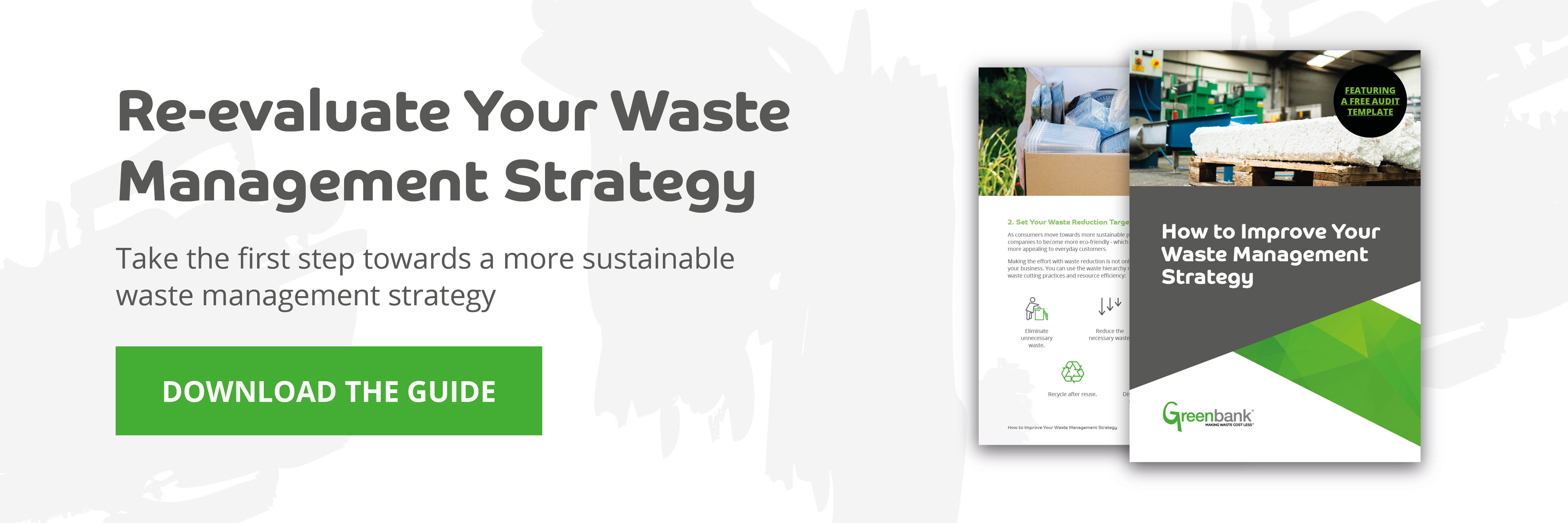Waste compaction is a simple, yet highly effective way of dealing with waste materials across a multitude of businesses and industries. Whether you work in construction or retail, the benefits of waste compaction are hard to miss. But for the uninitiated, what benefits does waste compaction actually achieve?
Below you’ll find nine benefits of waste compaction your business can achieve with a modern waste compactor.
- Cutting Operational Costs
- Better Site Hygiene and Safety
- Increased Space
- Lowering Labour Costs
- Improved Efficiency
- Aesthetic Benefits
- Minimising Environmental Pollution
- Better Public Image
- Potential New Revenue Streams
If by the end of this article, you’re interested in investing in your businesses waste management, consider booking a free waste management audit – we’ll help you better understand your waste streams and recycling processes as well as point out what you can improve to maximise the benefits that you see from waste compaction.
1. Cutting Operational Costs
Waste management is a necessary business cost like any other. However, without the right waste management policy in place – one that’s effective, that makes the right decisions about how waste is handled – it can be more expensive than it needs to be.
By compacting waste, businesses cut operational costs by reducing waste volume. A smaller volume of waste equals a smaller volume of trips needed to collect it and fewer skips to store it, meaning less money spent on skip hire.
Compacted waste, such as cardboard, is also easier to store. This means you don’t have to pay for plastic bin bags that represent an inefficient and environmentally unsafe waste disposal method.
2. Better Site Hygiene and Safety
Poorly-managed or badly disposed waste can sometimes lead to serious hygiene or safety issues. With waste compacted, it’s less likely for employees to slip, trip or fall, therefore making it easier for you to comply with safety regulations within the workplace.
Compactors also eliminate the issues associated with bins or skips, which can include:
- Misuse by employees or passersby.
- Pilferage.
- Potential for vermin infestation.
- Rotting waste.
This makes compactors the obvious choice for those looking to improve the hygiene conditions on a site or within a business. With fewer waste collection trips also means fewer times vehicles are parked or moving on-site, resulting in a reduced potential in collisions or accidents.
There’s also the potential of fewer fire hazards, as combustible material can be stored away from heat sources.
3. Increased Space
Waste compactors save space by making waste smaller and easier to store, turning bulky rubbish or recyclables into smaller sizes. Uncompacted waste is an absolute space-killer, whereas compacted waste takes up a fraction of the space. This means storage or working space can be increased.
For example, by using a polystyrene compactor, you could reduce the volume of your polystyrene waste by up to 98%. Our vertical balers offer similar levels of reduction, potentially reducing your business’s overall waste by up to 90%.
4. Lowering Labour Costs
Waste compactors only need the simple touch of a button to use. The compacted waste produced is also much easier to transport, as it’s now one item, rather than many loose pieces.
Trips to skips and bins are distracting and time-consuming and even though compacted waste may be heavy, it’s actually easier to transport because of the above reasons. Employees can focus on the more business-critical duties they have, rather than simply ‘taking out the trash’.
5. Improved Efficiency
Compactors are quick and easy to use. With the simple push of a button, you can have efficiently compacted ‘packages’ of waste. You don’t need to check if they’re full like you do with bins and they require incredibly minimal skill to use.
Similarly, portable compactors can help create a more flexible waste management process by taking up less space but also by being portable, meaning you can alter the organisation of your site with relative ease.
6. Aesthetic Benefits
Not only do waste compactors help clean up, they also help to make a site a bit nicer to work in. Not many people enjoy seeing loose waste or a lot of bins – and waste pile-up can be a real eyesore. Compactors eliminate the need for many bins and waste overflow, turning unsightly areas into organised ones.
7. Minimising Environmental Pollution
As we’ve mentioned, waste compaction means a smaller physical volume of the waste in its entirety, which means fewer trips needed to collect it. A key benefit of this is a smaller carbon footprint associated with your waste management, as it’s fewer miles needed to drive between your site and either a landfill or recycling centre.
It’s impressive how a simple change in physical space can have so many benefits.
8. Better Public Image
Running a business well, with minimal environmental impact and efficient service is more important than ever. Even employees appreciate an efficient waste-management process. Using a waste compactor is a good way of working towards this.
By compacting waste, not only do you produce more efficiency, but you limit your carbon footprint and pollution (from things like plastic waste). Efficient, greener businesses are much more popular in current consumer markets and eco-friendly strategies can even help gain tax relief from governments.
By doing something as simple as compacting waste, you could actually be improving your competitive edge.
9. Potential New Revenue Streams and Better Collaboration
With a dedicated compaction strategy, you can ensure a steady, consistent stream of waste. This means you’ll have more insight into how many waste collections you’ll need. If you’re working with private waste collectors, this helps to create a more consistent, proactive working relationship between them and your business.
When a compactor is used as part of a well-developed waste management strategy, you can predict your need for contracted waste collection and disposal, meaning you can give more information to any company you collaborate with. This will make them happier and result in better service.
Similarly, there’s also the possibility of selling your compacted recyclable materials, such as cardboard, polystyrene or plastic and creating a new revenue stream, where you can either profit or accrue some of the capital used elsewhere in your supply chain.
These benefits are all highly worthwhile, but waste compaction is only one part of an entire waste management process. How can you improve the rest of it?
Enhancing Your Entire Waste Management Strategy
We’ve developed a guide that answers that question. Insight this handy ebook, you’ll discover:
- The best practices for improving waste management.
- Advice on conducting waste audits.
- What to look for in waste management machinery such as compactors.
- How to choose a waste management provider.
We’ve developed this guide to help you decrease the cost of your waste management processes and we’re giving it away. Just click the button below to download.





